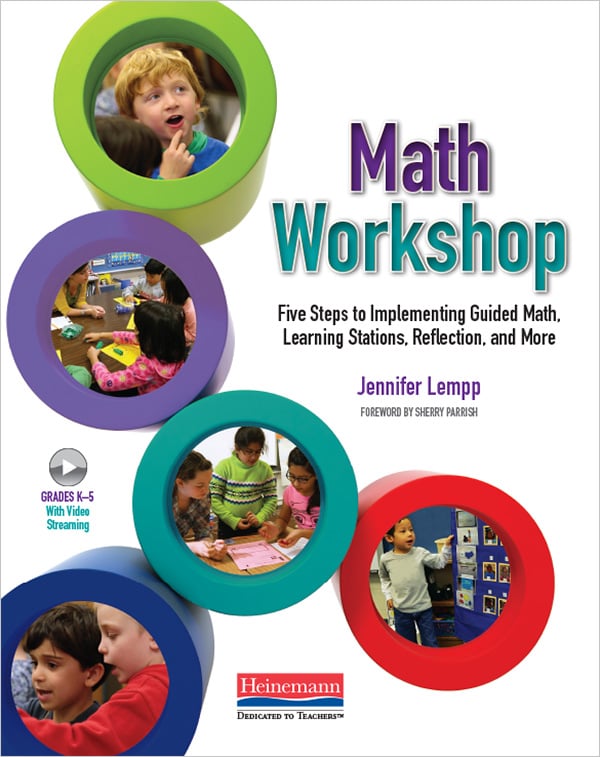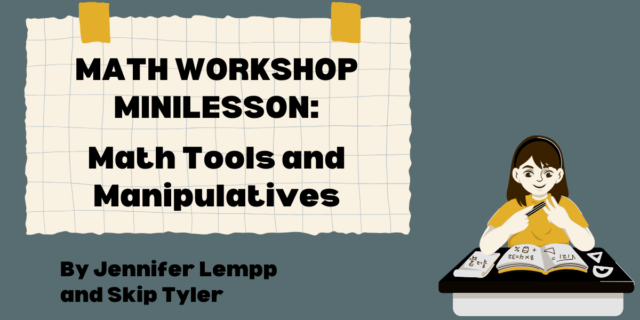
The following is an adapted excerpt from Jennifer Lempp’s Math Workshop.
To answer the question “What is math workshop?” it may be easiest to first think about what math workshop is not as opposed to what it is. To do this, consider the seven characteristics of successful math workshops.
What Math Workshop is not...

Characteristic 1: Students doing most of the math
We want students to be doing the thinking and the learning, and to do so we need to engage them in doing the math. Successful math workshops deeply engage students in the mathematics. This engagement might transpire through a number of structures; for example, some students may be working with the teacher in a small group while other students are exploring mathematics at learning stations. Whatever the arrangement is, it is not the teacher in front of the classroom doing the math; it is the students doing the math.
Characteristic 2: Students making choices
There is a wide range of choices students might be faced with; they may be choosing which learning station to explore, and/or they may have to decide what task to complete and who to work within each station. Students may choose what strategy to use to solve a problem and/or what manipulatives they use to support their thinking. Students who are given the choice of the activities, the choice in how long they spend on an activity, and the choice of what strategy to use to problem-solve are more invested and have more buy-in to their learning.
Characteristic 3: Students enthusiastically talking about their mathematical thinking and reasoning with each other
A classroom of students participating in math workshop is rarely a quiet room. Student discourse is encouraged, and respectful dialogue is expected. Students talk about their thinking, share with one another, listen to one another, and learn from each other. Students value the knowledge of their peers and look to one another as supportive colleagues in their learning environment.
Characteristic 4: Teachers facilitating, clarifying, connecting, monitoring, and collecting data as students solve problems
As teachers our roles may differ based on which math workshop structure we are using. However, regardless of the structure we choose to use, there are four roles teachers take on in math workshop:
- The teacher as facilitator. When we act as facilitators, we encourage independence, responsibility, and risk taking in students. Students come to realize that the teacher believes in them and their ability to solve problems.
- The teacher as clarifier and connector. We can ask thoughtful questions, encourage students to talk to one another, ask if students agree or disagree, and pro- vide the appropriate vocabulary when paraphrasing a student’s thinking. To encourage connections, we can use meaningful, real-world examples, another mathematics concept, or another content area.
- The teacher as monitor. We should monitor students’ participation, being on the lookout for students who might not be engaged, who might be “hiding” from doing the task at their learning station, or who might be displaying passive behavior. We should note which students’ voices we hear the most and encourage all students’ voices to be heard.
- The teacher as data collector. As teachers we know our students’ strengths, weaknesses, and learning styles; to get this information we use multiple forms of assessment, and collect some form of data each and every day.
Characteristic 5: Students working collaboratively
In a math workshop you will see students collaborating to solve problems and make sense of the mathematics. When students talk to one another, they improve their own reasoning and are exposed to other strategies. When students work together, their learning increases.
Characteristic 6: Teachers allowing students to struggle with challenging mathematics
In math workshop, the teacher supports students in persevering through challenging problems; we recognize that a student’s struggle is a part of the learning process. We want students to realize that a part of the process is getting wrong answers and learning from those experiences. Allow the opportunity for student exploration of strategies (and this may very well include struggle!). The methods that they use could be shared with the class, discussed, put under scrutiny, and revised. Students defend their strategy, choose to abandon their strategy if it lacks consistent results, or find another, more useful strategy. The thing that makes students successful is that they have the knowledge of when to use the one that best fits their purpose.
Characteristic 7: Teachers working with small groups and/or individual students
In math workshop, while students are working collaboratively in learning stations or delving into rich problem solving with one another, the teacher is working with small groups of students or individuals. These small groups are determined by what the teacher has observed as well as other data points. The teacher may also meet with one student during this time (considered a math conference) as a way to help clarify thinking or interject about a misconception.
Math workshop teachers recognize that there are a lot of students in the classroom, and no two students are exactly alike. Presenting to the whole class at once is like shooting for the middle. In shooting for the middle, you are missing many other students—those who may be struggling or have gaps and those who may be in need of enrichment. We are often trying to adapt for many students. By getting these students into smaller groups, we are able to find out more about what each student knows and does not yet know. As teachers we are able to make those adjustments more quickly, and we are better able to address the individual needs of students. In this way, differentiation can take place.



